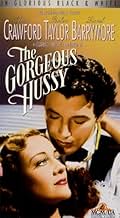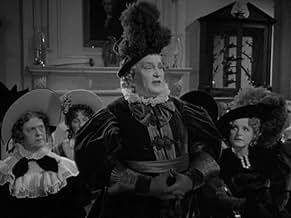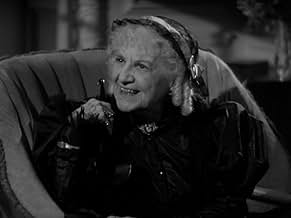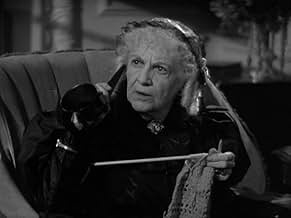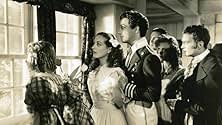NOTE IMDb
5,6/10
1,4 k
MA NOTE
Ajouter une intrigue dans votre languePresident Andrew Jackson's friendship with an innkeeper's daughter spells trouble for them both.President Andrew Jackson's friendship with an innkeeper's daughter spells trouble for them both.President Andrew Jackson's friendship with an innkeeper's daughter spells trouble for them both.
- Réalisation
- Scénario
- Casting principal
- Nommé pour 2 Oscars
- 4 victoires et 2 nominations au total
Rubye De Remer
- Mrs. Bellamy
- (as Ruby de Remer)
Avis à la une
THE GORGEOUS HUSSY, based on a 1934 historical novel by Samuel Hopkins Adams, is another one of those genteel forays into the past from squeaky clean MGM. The only compelling ingredients in this overlong saga about the controversial hussy Peggy Eaton who wielded much influence over President Andrew Jackson are a few of the performances and the novelty of actual political debates occurring in the context of a love affair; Hollywood seldom mixed those two elements. The first half hour is bone dead, with familiar performers strutting around in period costumes and delivering the necessary exposition. Joan Crawford is not particularly persuasive as a young tavern keeper's daughter. She looks somewhat haggard and hard, but still beautiful. Things liven up with the appearance of Andrew Jackson (Lionel Barrymore) and his unpopular and maligned wife Rachel (Beulah Bondi). Barrymore may have been a ham who gave basically the same performance in film after film, but at least he puts some juice into the proceedings, making the most he can of the extremely diluted representation of Jackson supplied by the script. Bondi is touching in her depiction of the ill-fated Rachel, the love of Jackson's life. Until then we have had to endure endless moments with a dashing but wooden Melvyn Douglas and a competent but unexciting contribution from neophyte Robert Taylor. Jimmy Stewart and later Franchot Tone are on hand too but only in a few scenes and to little effect. And we have the always nasty and conniving Alison Skipworth as a disapproving society matron to hold our attention. And the marvelous Zeffie Tilbury as Skipworth's deaf mother who disagrees strongly with her snobbish daughter's malicious gossip. Between these bits there are occasionally interesting sketches of the political contentions of the time, mostly about how much power should be granted to the individual states, foreshadowing the Civil War. But we never get a sense of what an extraordinary woman the title character was. Nothing in Joan Crawford's performance or in the material given her indicates that this is anything other than an unusually attractive and well behaved lady with romantic yearnings but someone for whose honor and reputation a President would dissolve his cabinet and change the course of US history? No way. You cannot make a polite film about these characters in this historical period, but this is what MGM tried to do.
No! No! No! What is that most modern, at least to her time, of actresses Joan Crawford doing in hoop skirts and crinoline? Pretty much making a fool of herself, not that it's her fault MGM should have known better. There is not one look or gesture that she makes that has a feeling of any period but the 20th century.
Both stagnant and silly this completely miscast picture takes an interesting and scandalous piece of American history, The Petticoat Affair, and make it seem asinine and trivial when it practically tore Jackson's presidency apart and did lead to most of his cabinet's resignation.
Proof positive that not every film that came out of Hollywood's golden age and its premiere studio was a classic worth seeing filled with top flight talent or not. Even if you are a completist of any of the stars work this will be a struggle to get through.
Both stagnant and silly this completely miscast picture takes an interesting and scandalous piece of American history, The Petticoat Affair, and make it seem asinine and trivial when it practically tore Jackson's presidency apart and did lead to most of his cabinet's resignation.
Proof positive that not every film that came out of Hollywood's golden age and its premiere studio was a classic worth seeing filled with top flight talent or not. Even if you are a completist of any of the stars work this will be a struggle to get through.
"The Gorgeous Hussy" impressed me at once as a rather trite, artificial history-based (I won't actually call it historical) film about the Eaton Affair scandal of Andrew Jackson's presidency. It's an odd subject somewhat to choose as the basis for a romance-filled drama, and the script doesn't do it a whole lot of justice at times. A lot of the dialogue is just difficult to swallow or sickly-sweet, and American history is treated with a kind of overly orthodox distorting reverence -- turning the scandal into a stage for Andrew Jackson to be held up as an early defender of the Union in a proto-iteration of the Civil War -- that grates.
There are good points too however: Lionel Barrymore creates a wonderfully memorable performance as the raucous and rough yet wise President Jackson. He makes the former president human even while the script presents him somewhat two-dimensionally as a kind of grumpy but lovable old uncle most of the time (with a few nice scenes where he gets to be principled and statesmanlike in the face of his congress). Joan Crawford seeps magnetism and sympathy as Margaret, even as we are not really allowed to see the struggles between men that make up much of the movie emotionally dramatized for her. These actors get to play a few nice dramatic scenes amid the posturing, including a very effective one after President Jackson's wife's death.
Unfortunately, the piety with which "The Gorgeous Hussy" treats American history extends to other elements of its subject matter. We are supposed to sympathize with Margaret about the viscous rumors that are spread about her, but we never really learn what the rumors are or why they are spread. In other words, in this Hays-code influenced feature, we see how the titular gorgeous hussy is gorgeous, but never really how she is a hussy.
There are a few fine performances here, and the film is quite watchable, but it is let down by an overly careful, pious, and reverent production in many respects.
There are good points too however: Lionel Barrymore creates a wonderfully memorable performance as the raucous and rough yet wise President Jackson. He makes the former president human even while the script presents him somewhat two-dimensionally as a kind of grumpy but lovable old uncle most of the time (with a few nice scenes where he gets to be principled and statesmanlike in the face of his congress). Joan Crawford seeps magnetism and sympathy as Margaret, even as we are not really allowed to see the struggles between men that make up much of the movie emotionally dramatized for her. These actors get to play a few nice dramatic scenes amid the posturing, including a very effective one after President Jackson's wife's death.
Unfortunately, the piety with which "The Gorgeous Hussy" treats American history extends to other elements of its subject matter. We are supposed to sympathize with Margaret about the viscous rumors that are spread about her, but we never really learn what the rumors are or why they are spread. In other words, in this Hays-code influenced feature, we see how the titular gorgeous hussy is gorgeous, but never really how she is a hussy.
There are a few fine performances here, and the film is quite watchable, but it is let down by an overly careful, pious, and reverent production in many respects.
'The Gorgeous Hussy' had a lot of potential to be good. The subject sounded really interesting. Clarence Brown may not be one of my favourite directors, but he did do some good films. His films more often than not looked great and he was often very good in his direction of his lead actresses, a prime example being Greta Garbo. Have always loved period drama films. Plus who can resist a cast with the likes of Joan Crawford, Lionel Barrymore, Melvyn Douglas and Beulah Bondi in the same film?
Sadly, the film was a pretty major disappointment. There are certainly far worse films out there and it has its good things, but a story that actually is a lot more interesting than the film made it deserved better. As far as Brown's films go it is a lesser effort and it is a lesser effort of Crawford's too, both film and performance. Everybody, even the few actors that came over well, did a lot better both before and since (primarily since as some of the cast are in early roles).
Certainly there are good things. The best asset is the production values. It is sumptuously designed and costumed and even better is the cinematography, it clearly loved Crawford who didn't always look this luminous at this point of her career. The best performance belongs to Barrymore, he has the juiciest character and gives the role so much zing and enthusiasm (it may not be what one calls a subtle performance but then again Barrymore was not a subtle actor, which is not actually a bad thing in his regard).
Bondi also comes over very well, making the very most with what she was given. The score is not too over-bearing or melodramatic.
Most of the cast disappoint. Crawford to me was too mannered in her role and never seemed to gel with the setting with too modern a look. Douglas, Robert Taylor, Franchot Tone and James Stewart all gave their fair share of good performances, but all four are dull in sketchy roles. Tone is particularly wronged and doesn't look comfortable with dispiriting material. Brown's direction at best is undistinguished and quite leaden.
Also felt that the story never properly engaged, with too deadingly dull a pace and with too much narratively being too uneventful. It is a shame too that the story didn't have the same amount of juice and venom that the character of Andrew had and took on a far too careful approach that made the film feel very safe. The script is well intentioned, but came over as too talky and preachy.
Summarising, rather lacklustre though not without good things. 4/10
Sadly, the film was a pretty major disappointment. There are certainly far worse films out there and it has its good things, but a story that actually is a lot more interesting than the film made it deserved better. As far as Brown's films go it is a lesser effort and it is a lesser effort of Crawford's too, both film and performance. Everybody, even the few actors that came over well, did a lot better both before and since (primarily since as some of the cast are in early roles).
Certainly there are good things. The best asset is the production values. It is sumptuously designed and costumed and even better is the cinematography, it clearly loved Crawford who didn't always look this luminous at this point of her career. The best performance belongs to Barrymore, he has the juiciest character and gives the role so much zing and enthusiasm (it may not be what one calls a subtle performance but then again Barrymore was not a subtle actor, which is not actually a bad thing in his regard).
Bondi also comes over very well, making the very most with what she was given. The score is not too over-bearing or melodramatic.
Most of the cast disappoint. Crawford to me was too mannered in her role and never seemed to gel with the setting with too modern a look. Douglas, Robert Taylor, Franchot Tone and James Stewart all gave their fair share of good performances, but all four are dull in sketchy roles. Tone is particularly wronged and doesn't look comfortable with dispiriting material. Brown's direction at best is undistinguished and quite leaden.
Also felt that the story never properly engaged, with too deadingly dull a pace and with too much narratively being too uneventful. It is a shame too that the story didn't have the same amount of juice and venom that the character of Andrew had and took on a far too careful approach that made the film feel very safe. The script is well intentioned, but came over as too talky and preachy.
Summarising, rather lacklustre though not without good things. 4/10
MGM in trying to expand Joan Crawford's repertoire into period costume pieces spared no expense and gave her one all star cast in this drama about the Peggy O'Neal Eaton affair. The basic facts are true, Peggy O'Neal, daughter of a Washington, DC tavern-keeper and widow of a young Navy Lieutenant, marries the Senator from Tennessee who then is chosen Secretary of War in President Andrew Jackson's original cabinet. The Cabinet wives however refuse to receive Peggy socially as does the wife of the Vice President John C. Calhoun. Jackson blows his cabinet up, requests resignations from all involved and Eaton and Peg are sent in exile so to speak as he is made Minister to Spain.
The real story is far more complex than that. Jackson did regard Peggy as a slandered woman, much like his late wife Rachel was. Rachel Donelson Robards Jackson dies between the election and inauguration of Jackson. Beulah Bondi plays her in the movie and it's the best performance in the film. In real life this whole affair was being maneuvered behind the scenes by John Calhoun and Secretary of State Martin Van Buren taking anti and pro Peggy positions respectively. Van Buren's character is barely mentioned here. Played by Charles Trowbridge, he's given one or two lines in the film.
Robert Taylor strikes the right note as the young Naval Lieutenant Bow Timberlake. After Timberlake and Peggy are married, he is ordered to sea and dies there. The manner of his death has never been satisfactorily explained. It's also not explained here and that leaves the audiences up in the air.
Franchot Tone plays John Eaton and I think a lot of his performance is left on the cutting room floor. In real life there is some question as to whether Eaton and Peggy were involved while she was married to Timberlake.
But the most fantastic error in this plot is John Randolph's interest in Peggy. The real John Randolph was impotent, his testicles never descended, he never reached puberty. He never had any romantic attachments with anyone, he wasn't capable of it. In real life John Randolph because he never reached puberty had this girlishly high-pitched voice when he spoke on the floor of Congress. No one ever dared make fun of him though as he was a crack shot with a dueling pistol. Melvyn Douglas played a character with no basis in reality.
One of the other things I found a bit much was Douglas's constant prattle about state's rights. To him this a nice philosophy to be debated on the floor of Congress. Louis Calhern's character who is admittedly like a previous reviewer describes him as a Snidely Whiplash villain, is ready for secession. He goes to Randolph and says that he's organized a movement and he wants Randolph to lead it. The real Randolph would have been hot to trot for that. Melvyn Douglas reacts in horror however, he threatens to expose Calhern's villainy. Calhern has to shoot him. But if you think about it, the only thing Calhern did was take that state's right talk of Douglas to its logical conclusion and translate it into action.
The real John Randolph was never assassinated, he died of natural causes and had no major role in the Peggy O'Neal affair at all.
Maybe some day someone will make a better film of this incident.
The real story is far more complex than that. Jackson did regard Peggy as a slandered woman, much like his late wife Rachel was. Rachel Donelson Robards Jackson dies between the election and inauguration of Jackson. Beulah Bondi plays her in the movie and it's the best performance in the film. In real life this whole affair was being maneuvered behind the scenes by John Calhoun and Secretary of State Martin Van Buren taking anti and pro Peggy positions respectively. Van Buren's character is barely mentioned here. Played by Charles Trowbridge, he's given one or two lines in the film.
Robert Taylor strikes the right note as the young Naval Lieutenant Bow Timberlake. After Timberlake and Peggy are married, he is ordered to sea and dies there. The manner of his death has never been satisfactorily explained. It's also not explained here and that leaves the audiences up in the air.
Franchot Tone plays John Eaton and I think a lot of his performance is left on the cutting room floor. In real life there is some question as to whether Eaton and Peggy were involved while she was married to Timberlake.
But the most fantastic error in this plot is John Randolph's interest in Peggy. The real John Randolph was impotent, his testicles never descended, he never reached puberty. He never had any romantic attachments with anyone, he wasn't capable of it. In real life John Randolph because he never reached puberty had this girlishly high-pitched voice when he spoke on the floor of Congress. No one ever dared make fun of him though as he was a crack shot with a dueling pistol. Melvyn Douglas played a character with no basis in reality.
One of the other things I found a bit much was Douglas's constant prattle about state's rights. To him this a nice philosophy to be debated on the floor of Congress. Louis Calhern's character who is admittedly like a previous reviewer describes him as a Snidely Whiplash villain, is ready for secession. He goes to Randolph and says that he's organized a movement and he wants Randolph to lead it. The real Randolph would have been hot to trot for that. Melvyn Douglas reacts in horror however, he threatens to expose Calhern's villainy. Calhern has to shoot him. But if you think about it, the only thing Calhern did was take that state's right talk of Douglas to its logical conclusion and translate it into action.
The real John Randolph was never assassinated, he died of natural causes and had no major role in the Peggy O'Neal affair at all.
Maybe some day someone will make a better film of this incident.
Le saviez-vous
- AnecdotesAccording to Melvyn Douglas, Joan Crawford got herself to cry by listening to recordings of "None but the Lonely Heart".
- GaffesThey are singing "Wait for the Wagon" on the hayride, but it wasn't written until 1850. "America" and "Listen to the Mockingbird" were not written at this time either.
- Citations
Daniel Webster: Well Miss Peggy, have you shaped any new political doctrines today?
Peggy Eaton: Ah Mr. Webster, I'm just an impressionable young woman.
- Crédits fousPrologue: "This story of Peggy Eaton and her times is not presented as a precise account of either--rather, as fiction founded upon historical fact. Except for historically prominent personages, the characters are fictional. The city of Washington in 1823--heart of a country not yet a century old, not yet beyond an occasional growing pain."
- ConnexionsFeatured in Great Performances: James Stewart: A Wonderful Life (1987)
- Bandes originalesAmerica, My Country Tis of Thee
(uncredited)
Music by Lowell Mason
Music based on "God Save the King" written by Henry Carey
[Played in the opening scene as part of the score]
Meilleurs choix
Connectez-vous pour évaluer et suivre la liste de favoris afin de recevoir des recommandations personnalisées
- How long is The Gorgeous Hussy?Alimenté par Alexa
Détails
Box-office
- Budget
- 1 119 000 $US (estimé)
- Durée1 heure 43 minutes
- Couleur
- Rapport de forme
- 1.37 : 1
Contribuer à cette page
Suggérer une modification ou ajouter du contenu manquant

Lacune principale
By what name was L'enchanteresse (1936) officially released in India in English?
Répondre

